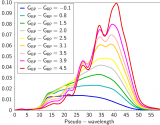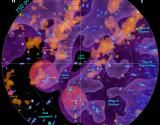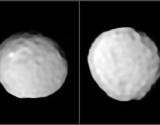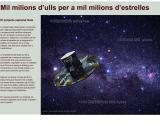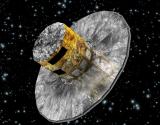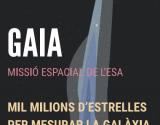Gaia is a cornerstone mission of the European Space Agency of this decade. Its objective is to clarify the origin and evolution of our Galaxy. For that purpose, Gaia will obtain a very precise 3D map of about a thousand million stars. Thanks to this mission we will be able to answer questions about the formation of the Galaxy, its shape and structure, the role of the dark matter in the Universe or how the stars evolve among many others. The five video included here explain the details of the Gaia mission, with spectacular 3D animations and interviews with Spanish experts working on the mission.
Videos
Participació espanyola a la missió Gaia
Type
Popularisation of Science
Web
Source
Date
Language
CA
ES
EN
Duration
3:19 min
Related News & Activities
First calibrated XP spectra
Source
Agència Espacial Europea (ESA)
Language
CA
Gaia has proven to be a powerful tool providing very precise astrometry and photometry in the first releases of the mission (see Gaia DR2 and Gaia DR1). The third release and beyond (find here the current release scenario planning) will include some calibrated spectrophotometric data.
The Gaia Mission app is now available for Android and iOS
Language
CA
The Gaia Mission app is now available for Android and iOS
A team of ICCUB researchers finds 582 open clusters in the Milky Way
Language
CA
The team, led by Alfred Castro-Ginard, discovered 582 new open clusters of stars, using data from the Gaia mission.
A new study reveals details of a “golf ball” shaped asteroid
Language
CA
The authors of the study reveal for the first time detailed images of Pallas, including of its cratered surface.
Related Material
Exhibitions
Mil milions d'ulls per a mil milions d'estrelles
The exhibition "Mil milions d'ulls per a mil milions d'estrelles" is dedicated to the Gaia mission, designed and built by the European Space Agency to measure the positions, distances and movements
Language
CA
ES
EN
DE
Press Radio & TV
The discoveries of the Gaia mission
The astronomer Josep Manel Carrasco explains the discoveries of the Gaia mission to the radio station Radio Sant Boi, especially about the second Gaia data release DR2. Since the release, several research groups across the world have been using the data, and 1.700 papers have been published.
Author
Josep Manel Carrasco, ICCUB-IEEC
Source
Ràdio Sant Boi
Language
CA
Graphic Material
Bookmark of Gaia
Bookmarks of the mission Gaia.
Source
GaiaUB
Language
CA
ES
Bookmark
Videos
The Gaia mission
The Gaia mission is a project of the European Space Agency in order to map more than hundreds of millions of stars with high precision.
Source
GaiaUB
Language
CA
ES
Popularisation of Science

